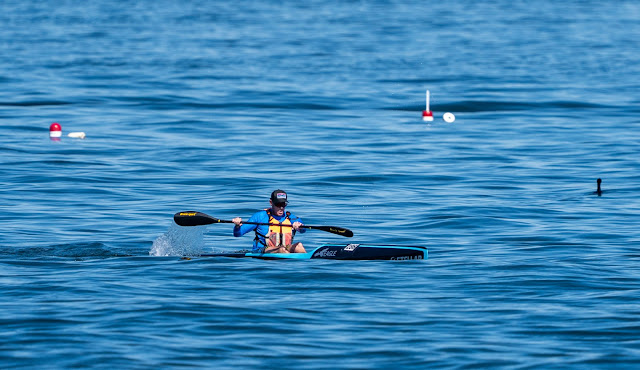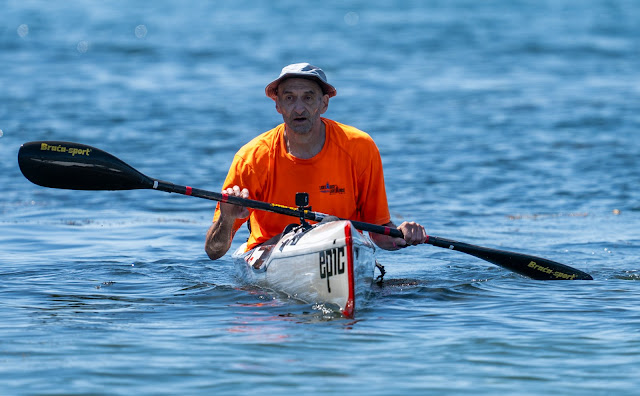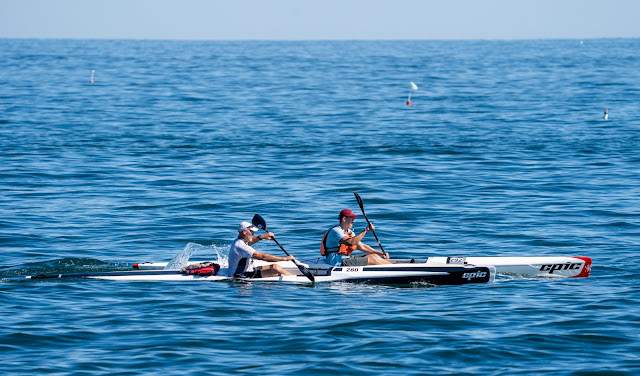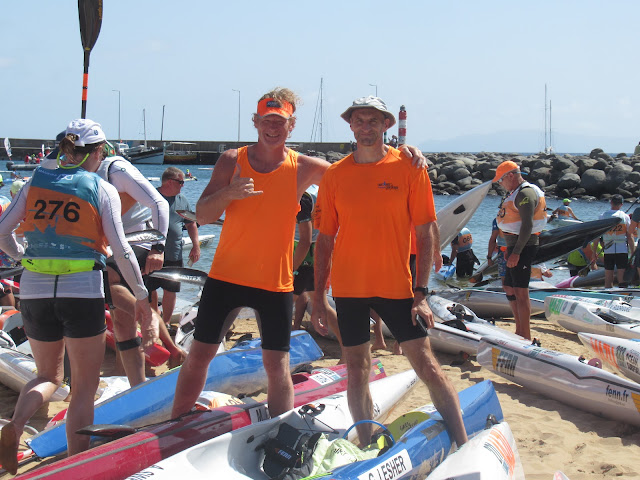Last year's top trio of Ian Black, Ed Joy, and Rob Jehn would be returning, despite my aggressive lobbying to institute podium term limits. Together with veteran Craig Impens (who I'm not sure is a literal veteran, but has definitely knifed some people in close combat), these guys already had 11 Blackburn championships between them, for pity's sake. While I've also finished in the money a few times myself, I'd never achieved the kind of shiny success you can sink your teeth into. Plus I'd qualify for a local boy exemption. Clamoring to take a step up would be fellow Bay Stater Eli Gallaudet, who in just 2.5 years of paddling has made the dizzying transformation from up-and-comer to son-of-a-bitch. I'd normally include John Hair in the contender list, but his non-stop litany of excuses eventually convinced me that he genuinely wasn't in fighting shape. He's carrying those extra 130 pounds well, though. And the two glass eyes? Barely noticeable.
 |
| Before the race, Eli demonstrates how he will smite his opponents mercilessly. |
All omens indicated that it'd be a fast year. When you're hitting all points of the compass, wind is never going to be your steadfast ally. Oh sure, you may get a stretch or two where you fall head over heels for a zephyr, but I guarantee she'll turn on you. Your vows of devotion will turn to oaths of bitter frustration. But today we'd have only a very light breeze, dying out during the race. In this case, better to never have loved... The outgoing tide would ferry us along for the first 7 miles - particularly in the Annisquam River - but would work against us for the final few miles. Temperatures would be insufficient for roasting. I figured it would take a time in the mid 2:30s to win, which meant I'd have to master temporal manipulation tout de suite to be a contender.
After dousing myself in sunscreen (because you never know when you'll lose your trousers), donning my silly hat (because I've aged into the role of that guy), and taping a few energy gels to strategically unreachable locations (because carrot and stick), I made my way to the staging area. To limber up and give myself a shot of extra pep, I tried grabbing one of my gels before the start. With the help of 3 other guys and an improvised pulley system, I eventually succeeded. My calisthenics had cost me more calories than I replenished, but at least I shoe-horned a little more caffeine into my system.
Twenty-five skis lined up and were soon launched on their way. Within a few seconds, the top 5 paddlers had separated from the pack. Fortunately, I had positioned myself amongst these 5 on the line. Whisked along via the vacuum left by their instantaneous departure, I remembered wishing I had remembered to hold my breath as everything went black. When I regained consciousness, I found that my lizard brain had managed the race pretty effectively in my absence, safely slotting me onto Eli's side draft. That was one of my nicknames in high school, by the way. Lizard Brain. Also, Side Draft. Weird.
I took stock of the situation. Ian and Ed had gapped Rob and Craig, who in turn had gapped Eli and his parasitic sidekick. Knowing that I'd soon lack the strength or willpower to make a token gesture towards sharing the load, I decided to get that shameless performance out of the way. We were roughly 2 boat lengths behind Rob and Craig when I started my (ahem) surge. Thirty seconds later, we were still in that same ballpark. I scored this as a major victory and slowed (unintentionally, granted) to let Eli resume our shared pursuit.
Competitors from earlier heats were opting to follow the winding buoy-delineated channel to maximize the advantage of the strong tidal current. The first 4 skis were likewise eschewing shortcuts through shallower water. With 17 years experience navigating the treacherous Annisquam under my belt, I've learned one undisputable truth. You can always convince yourself that the guy ahead is taking a terrible line. Never one to ignore misinterpreted life lessons, I twice tried to improve on the route established by the ignoramuses in front. Amazingly, these forays into uncharted waters did not end up with me beached on a sand bar, gasping for air. But neither did they buy me any advantage. The before and after pictures were the same - on Eli's draft.
While Ian and Ed had continued to widen their lead. We third-stringers maintained a maddening position 2 lengths behind Rob and Craig, despite my best efforts to will Eli into bridging the gap. At the mouth of the Annisquam, however, he finally relented and caught them. The ongoing mental strain of serving as the conduit for all my race aspirations was apparently too much to bear. I could see Eli straighten in the bucket as I released him from his heavy obligation. Rob and Craig - neither lacking a robust poids-de-vivre (in a good way!) - could doubtless shoulder the load more comfortably.
We accept a certain level of risk when racing, but there's one peril that strikes terror into even the stoutest heart. It hits without warning. It's utterly debilitating. And it will eventually happen to you. Weed Delirium. Like rabies, once you exhibit symptoms, you're already beyond help. You're not slow because of current, wind, waves, fitness, balance, or fatigue. You're slow because you have weeds. Like being struck by lightning, this is something that theoretically can happen and merits a page 7 article in the newspaper (or, as the youngsters call it, "the what now?"). But you are not currently being struck by lightning. And you don't currently have weeds. At mile 4, Craig contracted Weed Delirium.
Since we had grouped up, Rob and Craig had been paddling more-or-less side-by-side, with Eli on Rob's stern draft, and me behind Eli. From my angle, I couldn't see the tell-tale look of crazed frustration that precedes Weed Delirium, but Craig's sudden stop and subsequent back-paddling left little doubt about its dreadful onset. The fact that he saw no weeds floating off his rudder was, of course, immaterial. There is no cure.
 |
| Ian would have had a lonely trip around Cape Ann if he wasn't accompanied by his lucky cormorant, Cody. (Photo courtesy of Mike Sachs) |
 |
| Poor Ed had only the voices in his head. (Photo courtesy of Mike Sachs) |
An exceptionally strong paddler, Craig was able to sprint back onto the end of the 4-boat train. When a boat wake temporarily disrupted our band of brothers, he leveraged the opportunity - moving quickly by me and Eli to resume his customary position beside Rob. A little sibling rivalry, but nothing to upset the overall family dynamic. Around 5.5 miles into the race, however, when our bonhomie was again challenged by a wake, I found myself unceremoniously disowned by my erstwhile clan. Attempts to re-ingratiate myself - I wasn't above begging and bribing - were met with indifference. I like to think that it was because I was already too far back to be heard.
I couldn't be too upset at how my race had progressed thus far. Without Eli and the others dragging me, I never would have maintained such a pace. Surely they had provided me with enough of a cushion to hold off John. Especially if I pictured him riding low, water sloshing over the gunwales, blindly caroming from shore to shore in the Annisquam. Nevertheless, I wasn't quite ready to phone in a 6th place finish. If you can't paddle faster than your competitor, you paddle smarter. And if you're not clever enough for that, you just paddle a different route. This never works, but at least you're seizing the reins of your destiny. Rob, Craig, and Eli were staying offshore, so I went onshore. Bring on the destiny!
Shockingly, this "strategy" actually paid dividends. Right near the rocky coast, I was able to find some waves to ride. By the time we arrived at Halibut Point (a real puncture risk, given how closely I passed), I was abreast the trio - at least as seen from one particular angle, for which I include photographic proof. However, because they were 100 feet further from the coast, I was unable to join them before we started our open water crossing of Sandy Bay. Now that we were all paddling again in the same conditions, I started my inexorable retreat.
 |
| If Mike had only moved 20 yards to his left, I'd have been ahead of Rob too. (Photo courtesy of Mike Sachs) |
Under normal circumstances, we'd have arrived at our denouement. I had battled heroically, but now my race was run. Let's just hear the results and get to the party. But no! Because in what should not be an entirely unexpected narrative twist due to shrewd foreshadowing... Weed Delirium. Craig once again stopped abruptly. I know when I've had the WDs, I mutter psychotically to myself - "Are they on me? I feel like they're on me! They're on me, aren't they?" I wasn't close enough to hear Craig, but he successfully mimed the sentiment.
Thanks to Craig's inner demons, I again enjoyed a temporary promotion to 5th place. Crossing Sandy Bay I favored an outside line, while Rob and Eli stayed well off to my right. When Craig inevitably powered up again, he chose my route. We paddled beside one another for a while, during which time it was all I could do to refrain from poking the bear with "What's that you have dragging from your rudder?" After all, I'd have to eventually see Craig on dry land and I can't run as fast as I used to.
 |
| Mary Beth and Jean were so well synchronized that they shared a paddle. (Photo courtesy of Mike Sachs) |
Just prior to Straitsmouth, Craig started to move ahead. Aided again by a tight line along the shore, I was able to keep him within perhaps a half-dozen boat lengths for the next couple of miles. The long, open crossing to the Back Shore, however, spelled my doom. Craig pulled away, ultimately putting 2.5 minutes on me by the finish. The remainder of my voyage was relatively uneventful, with occasional jolts of adrenalin fueled by finding myself imprudently close to shoals - it was hard to give up my successful coast-hugging lifestyle. The final couple of miles across Gloucester Harbor were typically boisterous, but I avoided any close encounters with homicidal powerboats.
Let's allow a few incredible finish photos speak for themselves.
 |
| I don't know if the 'stache make Rob any faster, but it definitely makes him 15% cooler. (Photo courtesy of Mike Sachs) |
 |
| We keep telling Eli that he doesn't need to turn his head to breathe, but he had one too many swimming lessons as a kid. (Photo courtesy of Mike Sachs) |
 | ||
Craig looking intimidating, but with a glimmer of the madness still in his eyes. (Photo courtesy of Mike Sachs).
|
I couldn't help interrupting a little. Nearly 20 miles of all-out paddling takes a toll even on the strongest athletes, as shown in these post-finish shots.
 |
| These guys left everything on the water. (Photos courtesy of Mike Sachs) |
 |
| Holy Hell! What happened here? Best guess - this geezer was buried at sea 80 years ago and some shaman reanimated his corpse for the race. (Photo courtesy of Mike Sachs. Thanks, Mike.) |
My time of 2:49:35 put me just a scooch behind Ian's winning time of 2:35:42. Two scooches, maybe. Ian and Ed had duked it out for a few miles of the race before separating, with Ed finishing 2nd at 2:37:33. Ed won this race back in 1996, so it's heartbreaking to see how he's let himself go in the intervening 29 years. Rob and Eli were even coming around the Dog Bar, but Rob had the superior harbor cruise to take 3rd. Stacy Wu was the first woman across the line, in an impressive 3:01:39. The local team of Bernie Romanowski and Andrew Metz claimed the double's crown. Andrew's been out there fighting the good fight lately, so it's gratifying to see him get an unqualified win. Bernie I couldn't give a fig about.
 |
| The super-podium consists of exactly as many people as needed to get me on it. |
 |
| Even ice cream couldn't erase the bitter taste of yet another loss to Rob. |
Once again, I wrote too slowly for anyone to register for this coming Sunday's Bay State Games Paddling Competition, but do me a favor and put it on your calendar for 2026. I'll get credit for the referral. For those of you who prefer your water fresh and flat, the USCA Nationals are coming up August 7-10 on the Connecticut River in Northfield, Massachusetts. Looks like we'll have a field of heavy hitters for the unlimited kayak race on the 8th. On August 23, you can choose your poison - the rescheduled Sakonnet Race (Sakonnet inlet, Portsmouth, Rhode Island), The Trojan (Hudson River, Athens-to-Troy, New York), or The Penobscot Passage (Penobscot River, Bangor, Maine). See you there. Or there. Or there.






























